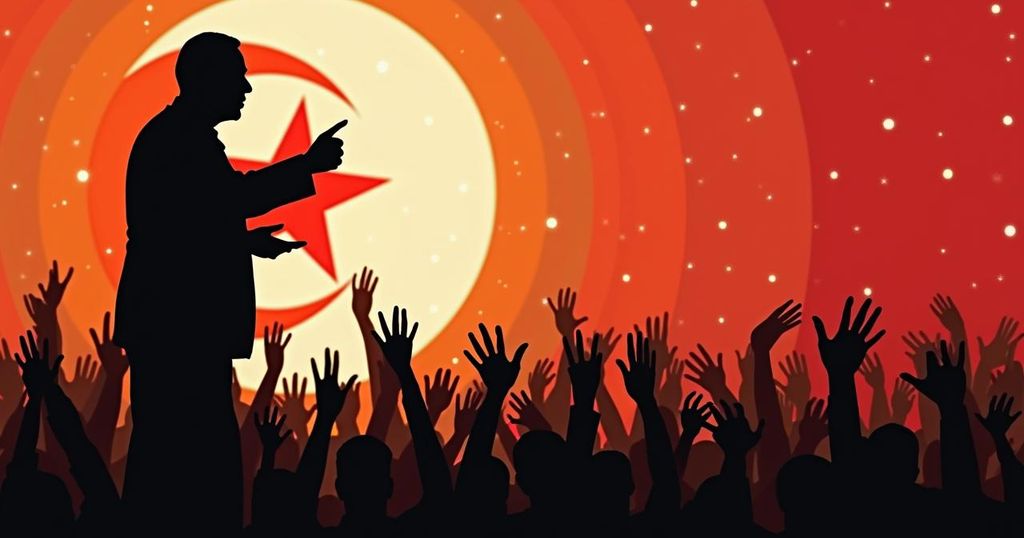Kais Saied’s Quest for Re-election Amidst Controversy and Repression in Tunisia
Tunisia’s President Kais Saied is seeking reelection on Sunday with limited opposition due to a manipulated political environment. One of the candidates was jailed days prior to the election. Saied’s tenure has been marked by authoritarian practices and significant democratic backsliding since 2019, raising criticisms from human rights organizations. Protests have erupted against his governance, and public apathy is expected to be reflected in voter turnout during these elections.
In the lead-up to the presidential elections in Tunisia scheduled for Sunday, President Kais Saied is positioning himself for re-election amidst significant controversy and opposition fragmentation. Since his election in 2019, President Saied has undergone a dramatic transformation from a promising figure of the Arab Spring to one characterized as an autocrat by his critics. Out of several hopeful challengers, only two candidates were approved by the electoral commission, one of whom, Ayachi Zammel, was incarcerated just days prior to the election, having received a 12-year sentence for falsifying documents. Despite his legal troubles, his name will still be featured on the ballot. The current political landscape reflects a consolidation of power not seen since the ousting of long-term dictator Zine al-Abidine Ben Ali in 2011. Observers, including Sarah Yerkes from the Carnegie Endowment for International Peace, assert that the political environment has been manipulated to eliminate any viable competition, rendering the election more of a personal referendum on President Saied rather than a genuine democratic process. The absence of campaign rallies and public debates has further intensified this perception. The leading opposition party, Ennahda, has witnessed unprecedented levels of arrests among its members, impacted severely by state-led actions designed to suppress dissent and maintain the President’s grip on power. Human Rights Watch has documented the exclusion of various potential candidates through methods of legal persecution and imprisonment, demonstrating a concerning trend towards authoritarianism. As protests demanding free and fair elections continue in the capital, Tunis, the legitimacy of the electoral process remains heavily questioned. President Saied’s presidency has witnessed a rapid decline in democratic norms, evidenced by Tunisia’s fall from 53rd to 82nd position on the Economist Intelligence Unit’s democracy index. Despite initial promises for economic revitalization and anti-corruption measures, high unemployment rates and economic stagnation remain pressing issues, particularly affecting the youth population. Furthermore, Saied’s controversial blame-shifting strategies regarding migratory pressures and demographic changes have sparked social unrest and accusations of racism, leading to both support and opposition from various segments of society. As election day approaches, the prevailing sentiment reflects a significant voter apathy, with expectations of low turnout mirroring the prior year’s dismal electoral participation. Given these dynamics, the anticipated election outcome appears to favor President Saied, although its legitimacy continues to be challenged by the atmosphere of fear and repression that characterizes Tunisia’s current political landscape.
This article addresses the current political situation in Tunisia as President Kais Saied seeks reelection in an environment characterized by allegations of authoritarianism and electoral manipulation. Tunisia, once viewed as a beacon of democracy following the Arab Spring uprisings that began in 2010, has experienced significant regressions under Saied’s rule since 2019. His government has enacted measures that dismantle parliamentary powers and suppress opposition, posing critical questions about the future of democracy in the country. The article also highlights the implications of human rights violations linked to the electoral process—evident from the imprisonment of rivals and the broader political repression aimed at dissenting voices, particularly those from established opposition factions like Ennahda. Socioeconomic challenges continue to exacerbate the political crisis, leading to protests and declining public support for Saied.
In summary, as the elections approach amid an apparent lack of genuine competition, President Kais Saied is poised for reelection. His regime’s efforts to consolidate power, along with rampant human rights abuses, have led to significant public disillusionment, and protests reflect a growing disdain for the existing political climate. As Tunisia’s struggle for democracy unfolds, the long-term implications of the current electoral practices and Saied’s governance strategies pose uncertainties about the country’s trajectory moving forward.
Original Source: www.bbc.com




Post Comment